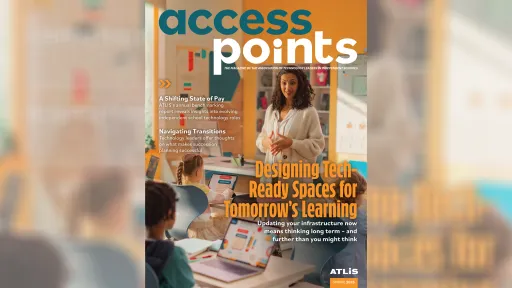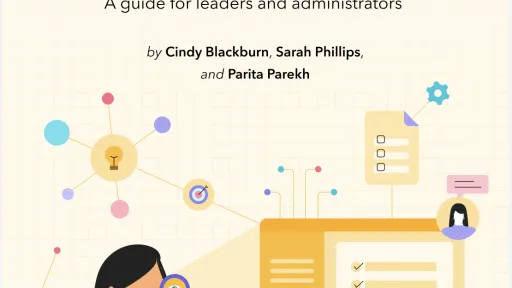In independent schools, leaders face the critical challenge of navigating constant change while shaping how technology serves students, faculty, and the broader community. For technology professionals — especially women — this work often happens in isolation, amplifying the need for strategies to attract, retain, and support top talent. Addressing these challenges isn’t just about solving immediate problems; it’s about ensuring schools provide inclusive, innovative environments that reflect the diversity of the communities they serve.
Unfortunately, conversations around diversity, equity, and inclusion have grown more complex and polarizing. It’s a reality that can feel unsettling, particularly in environments where resources are limited and priorities are stretched thin. As someone who has worked closely with leaders across diverse organizations, I’ve seen how intentional efforts to foster belonging can transform teams and entire institutions. At the same time, I’ve heard the concerns of those who feel excluded from these conversations or worry about their place in a changing landscape.
What I’ve learned is that inclusion is about connection, not division. In independent schools, where we cultivate the next generation of leaders and thinkers, embracing diverse perspectives isn’t optional — it’s essential. Creating communities where everyone feels seen, valued, and supported strengthens the entire institution. We not only improve outcomes for individuals but also strengthen the entire institution.
What’s at Stake for Schools?
Retention and recruitment for leadership roles continue to challenge schools. Schools aren’t just competing with each other; they’re up against industries offering higher salaries, clearer advancement pathways, and more visible workplace wellness initiatives. To attract and retain professionals who reflect the inclusive communities schools aim to cultivate, intentional efforts are required.
Here’s what schools need to focus on:
- Attracting talent: Schools must go beyond standard recruitment practices to demonstrate a commitment to inclusion and support. Research underscores that professionals are drawn to environments where they see themselves reflected in leadership and culture.
- Retaining talent: Without providing mentorship, community, and growth opportunities, talented professionals face burnout and disengagement. Fostering a sense of belonging and addressing systemic barriers such as unequal pay or a lack of pay transparency directly improve retention rates.
- Supporting growth: Schools need to invest in leadership pipelines by providing skill-building opportunities and active sponsorship. Career progression for individuals working in technology often stalls without visible support structures. Transparent leadership assessments can help identify untapped potential and ensure every leader has a clear pathway to growth.
Catalyst for Connection
The ATLIS Women in Tech meetups and online community were created to tackle these issues head-on. At its core, this new initiative offers support, mentorship, and connection for women in ed tech leadership. Inspired by conversations with women at the ATLIS Annual Conference, the community bridges the gap between challenges and actionable solutions.
This isn’t just networking; it’s about creating meaningful, lasting support systems where women can:
- Share challenges and collaborate on solutions.
- Build confidence through peer support.
- Access mentorship and professional development tailored to their unique needs.
As someone who has spent years in technology and executive leadership, I know firsthand how transformative these connections can be. Independent schools prioritize belonging for their students; it’s time we extend that same commitment to the adults who serve them.
Bridging the Gaps
I recognize that creating a women-only space might seem to conflict with my broader advocacy for inclusion. It’s a question I’ve wrestled with myself: How can I advocate for spaces that bring everyone together while creating one specifically for women in leadership?
The answer lies in understanding what inclusion truly means. Inclusion isn’t about treating everyone the same; it’s about meeting people where they are and addressing unique challenges that might otherwise go unseen or unsupported. For many women in technology, the absence of peers or role models in leadership positions can make their journeys isolating. A space like ATLIS’s Women in Tech meetups and online community help bridge that gap, providing targeted support to empower these leaders while enriching the broader school community.
This group isn’t about exclusion; it’s about elevation. By addressing the specific challenges women face, we strengthen their ability to contribute fully to their schools and foster a more collaborative and innovative environment for everyone. Ultimately, the goal is not to separate but to elevate, ensuring a more equitable playing field for all.
Lauren Neal’s research in Valued at Work: Shining a Light on Bias to Engage, Enable, and Retain Women in STEM provides practical steps to create environments where professionals feel valued. Key strategies include:
- Create clear paths to leadership. Structured decision-making frameworks and assessments help ensure equitable opportunities for
all leaders. - Foster psychological safety. Professionals perform their best in environments where they feel safe to share ideas and make mistakes without fear of judgment. Leaders can prioritize this by modeling vulnerability and encouraging open dialogue.
- Invest in mentorship, sponsorship, and coaching. Mentorship provides guidance, while sponsorship actively advocates for advancement. Coaching supports navigating leadership transitions with confidence, and an experienced coach can bring out the strengths that are intrinsic to the individual.
- Recognize contributions. Recognition fuels retention and reinforces a culture of appreciation. Highlighting achievements inspires others and creates momentum for further success.
- Provide equitable access to development opportunities. Access to training, leadership development, and networking opportunities ensures no leader is left behind.
Broader Impact
Groups like the ATLIS Women in Tech Meetups demonstrate how shared spaces can address systemic challenges while benefiting the entire institution. These groups are about creating environments where everyone has the tools and support to thrive. Here’s how they make a difference:
- They create resilience. By reducing burnout and providing critical support, groups and cohorts help leaders sustain high performance in demanding roles.
- They foster collaboration. Shared experiences and resources spark innovation and lead to more effective and efficient solutions.
- They build leadership pipelines. These groups nurture future leaders by equipping members with confidence, skills, and relationships for advancement.
Creating a Culture of Support
At their core, independent schools are learning organizations, and their success hinges on the people who lead them. By creating spaces where leaders feel valued and supported, we foster a culture that strengthens schools from within. As I often say, “To build the future we want to see, we must invest in the people who will create it.”
The ATLIS Women in Tech initiative offers a venue to tackle retention and inclusion challenges in technology leadership. Whether you’re a school administrator, technology leader, or advocate for inclusive communities, there’s a place for you in this work. Together, we can create schools that reflect the best of what we hope to see in the world.



